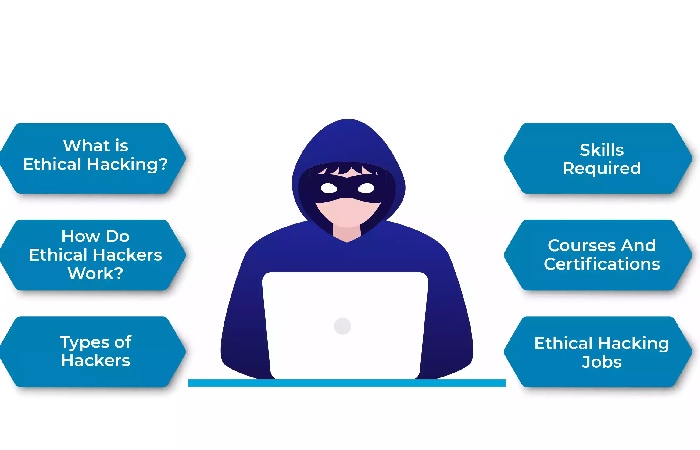The ethics of hacking, often referred to as ‘ pen testing ‘ or ‘penetration testing,’ consists of evaluating computer systems and networks to discover possible vulnerabilities and flaws in their security. Unlike malicious hackers who seek to exploit existing vulnerabilities for illicit purposes, ethical hackers do so to strengthen the security of an organization or system.
In this context, ethical hacking has become an essential tool for companies, governments, and organizations that want to protect their digital assets and confidential data.
Unlock the secrets of ethical hacking as TSR breaks down how it works, introduces the professionals behind it, and emphasizes why their work is vital in combating cyber threats.
What is ethical hacking for?
- Ethical hacking is critical in protecting data and preventing cyber attacks by helping organizations strengthen their infrastructure and improve security measures.
- ‘Ethical Hacking in the International Marketing MBA’ refers to using hacking skills ethically and legally in an international MBA program focusing on marketing.
- Ethical hacking in an International Marketing MBA context can be a valuable tool to ensure data security, comply with regulations, and improve marketing strategies.
- It helps professionals understand the importance of cybersecurity and use hacking skills ethically to benefit their organizations and clients.
What are the basic principles of ethical hacking?

The basic principles of ethical hacking include the following:
- Consent: Ethical hackers must obtain explicit permission to evaluate the security of a system before performing tests.
- Legality: All ethical hacking activities must be carried out within the limits of the law and comply with applicable regulations.
- Transparency: There must be clear communication with the organization or individual requesting security testing, and all actions taken must be documented.
- Confidentiality: Confidential data and information obtained during testing must be handled securely and not disclosed without authorization.
- Integrity: Ethical hackers must conduct their tests without unduly damaging or compromising the systems tested.
- Accountability: Ethical hackers ensure that identified security issues are appropriately reported and addressed.
Importance of ethical hacking to protect systems and data
Ethical hacking is crucial to protecting systems and data for the following reasons:
Vulnerability Identification: Helps identify weaknesses in systems and applications before cybercriminals exploit them.
Improved Security: Allows organizations to improve their cybersecurity and mitigate risks proactively.
Regulatory Compliance: Helps businesses comply with security and privacy regulations, such as the EU General Data Protection Regulation (GDPR).
Sensitive data protection: Helps protect confidential and sensitive data from unauthorized access.
Reputation and trust: Help maintain an organization’s reputation by demonstrating its commitment to information security.
Differences between ethical hacking and malicious hacking
The main distinctions between ethical hacking and malicious hacking are the following:
Purpose: Ethical hacking is carried out to strengthen security and detect vulnerabilities for subsequent correction, in contrast to malicious hacking. Which pursues the exploitation of vulnerabilities for personal gain or to cause harm to third parties.
Consent: Ethical hacking is done with the explicit permission of the system owner, while malicious hacking is illegal and done without authorization.
Legality: Ethical hacking is carried out within legal limits, while malicious hacking violates the law.
Ethics: Ethical hackers follow principles like transparency and confidentiality, while malicious hackers have no ethical restrictions.
Steps to become an ethical hacker
To become an ethical hacker, the following steps can be followed :
Acquisition of technical skills
These technical skills include a variety of knowledge and skills in areas related to cybersecurity and technology.
Here are specific steps to acquire these skills:
- Computer Science Fundamentals: Understand computer science fundamentals, such as operating systems (Windows, Linux, macOS), computer hardware, and networking basics.
- Programming and scripting: Learn relevant programming languages like Python, JavaScript, Ruby or C/C++. Programming is crucial to understanding and developing security tools.
- Networks and protocols: Understand networking concepts, such as TCP/IP, DNS, HTTP, VPNs, and routing. Learn how to use network scanning tools like Nmap.
- Operating systems: Familiarize yourself with client and server operating systems, especially Linux and Windows. You must know its structure, configuration, and administration.
- Network and system security: Study security techniques, including authentication, authorization, encryption, firewalls, intrusion detection, and log analysis.
- Ethical hacking tools: Learn and practice with security and ethical hacking tools, such as Metasploit, Wireshark, Burp Suite, and other specific applications for penetration testing.
- Cryptography: Understand the principles of cryptography and data encryption and how they are used in information security.
Some More Skills
- Vulnerability management systems: Learn to use tools like Nessus or OpenVAS to identify vulnerabilities in systems and networks.
- Malware analysis: Study how to analyze malware and understand how it works. This is essential for identifying threats and developing countermeasures.
- Virtualization and Lab Environments: Set up virtual lab environments for risk-free practice. Platforms like VirtualBox or VMware are helpful.
- Participate in security communities: Join ethical hacking communities, security forums, and online groups to learn from other experts and share knowledge.
- Capture the Flag ( CTF ): Participate in CTF competitions, where you can put your skills to use and solve security challenges.
- Formal training and certifications: Consider obtaining formal training in cybersecurity or recognized certifications in ethical hacking, such as those mentioned in the previous message.
Acquiring technical skills in computer security is an ongoing process and requires dedication and constant practice. With time and experience, you can become a competent, ethical hacker and help protect systems and data effectively.
Recommended Certifications and Training for Ethical Hackers
Obtaining certifications and specific training in ethical hacking is essential to validate your skills and knowledge in computer security. Here are some of the most recognized and recommended certifications for ethical hackers:
- Certified Ethical Hacker (CEH): Offered by the EC-Council, this certification is one of the best-known in ethical hacking.
- CompTIA Security+: This certification is a great starting point for those looking to enter cybersecurity. Covers general security concepts, including ethical hacking.
- Certified Information Systems Security Professional (CISSP): Delivered by ( ISC ) ², this certification is widely recognized and is geared toward information security management, including aspects related to ethical hacking.
- Certified Information Security Manager (CISM): Also offered by ISACA, this program focuses on information security management and is ideal for those who aspire to serve in leadership roles in the security field.
- Certified Information Systems Auditor (CISA): Another ISACA certification focuses on information systems auditing and risk management, even addressing aspects of ethical hacking.
- Offensive Security Certified Professional (OSCP): This Offensive Security certification is highly respected and requires passing a practical exam that involves compromising systems in a controlled environment.
- Certified Penetration Tester (CPT): Offered by Mile2, it focuses on penetration testing and ethical hacking skills.
- Certified Secure Software Lifecycle Professional (CSSLP): Also offered by (ISC)², it focuses on software development security but is relevant for ethical hackers identifying application vulnerabilities.
- Certified Hacking Forensic Investigator (CHFI): Also offered by EC-Council, it focuses on digital forensic investigation and is helpful for those who want to specialize in incident response.
In addition to earning certifications, consider participating in training courses and hands-on workshops. Some online training providers and organizations, such as Offensive Security and SANS Institute, offer specialized ethical hacking training courses.
Phases of ethical hacking
The ethical hacking process is generally divided into several phases:
- Recognition and information collection
- Identify the target and collect relevant information, such as IP addresses, domain names, and organization details.
- Vulnerability scanning and enumeration
- Scan the network and systems for open ports, services, and known vulnerabilities.
- Exploitation and obtaining access
- Exploit identified vulnerabilities to gain access to systems or applications.
- Access maintenance and post-exploitation
- Maintain access to investigate further and gather additional information.
- Fingerprint coverage and trace elimination
- Delete clues and evidence of the activity carried out to avoid detection.
Ethical principles for ethical hackers
Ethical hackers are guided by ethical principles and standards of conduct that help them carry out their activities responsibly and legally.
Here are some of the fundamental ethical principles for ethical hackers:
Consent and authorization: Ethical hackers must obtain explicit consent and written approval before conducting penetration tests or evaluating the security of any system or network. It means they should not engage in activities without the system owner’s permission.
Confidentiality: Information and data obtained during security testing must be treated with the utmost confidentiality.
Integrity and not harm: Ethical hackers must conduct their tests in a way that does not cause unnecessary or irreversible damage to systems and data. The goal is to identify vulnerabilities, not exploit them to cause harm.
Responsibility and Accountability: Ethical hackers ensure that identified security issues are appropriately reported, and action is taken to correct them. They must also take responsibility for their actions.
Constant Learning: Ethical hackers must commit to learning and staying current on the latest cybersecurity techniques and threats.
Do not profit illegally: Ethical hackers should not use their knowledge and skills to enrich themselves, steal confidential information, or carry out illegal activities. Your focus should be on protecting and improving cybersecurity.
Cooperation with authorities: In cases where criminal activity is discovered during security testing, ethical hackers must fully cooperate with legal authorities and comply with their legal obligations.
These ethical principles are critical to ensuring that ethical hackers act responsibly and benefit society by protecting systems and data rather than putting them at risk. Ethical hackers play an essential role in cybersecurity by helping to strengthen cyber defenses and prevent malicious attacks.
Legal liability and data protection
- All actions taken by ethical hackers must be within the limits of the law. It involves compliance with laws and regulations related to cybersecurity and data safeguarding.
- Ethical hackers must maintain a comprehensive record of all actions taken during security testing. Covering the approaches used, achievements achieved, and sustained communication with the client or entity responsible for the system.
Responsible Vulnerability Disclosure
- Responsibly inform the organization that owns discovered vulnerabilities and give them time to fix the problem before making it public.
- Ethical hackers must follow responsible disclosure practices if a critical vulnerability is discovered. It involves notifying the organization that owns the system before publicizing the exposure, allowing them time to remediate it.
Examples of the use of the ethical hacker
Ethical hackers play an essential role in cyber security by helping to identify and fix vulnerabilities before cybercriminals explore them. Here are examples of situations where ethical hackers are very useful:
System Penetration Testing: Ethical hackers perform penetration tests on networks and computer systems to identify weaknesses and vulnerabilities. It may include security testing on web applications, servers, databases, and other digital assets.
Website Security Assessment: Ethical hackers can help businesses assess the security of their websites and online applications.
Mobile App Security Analysis: Ethical hackers can perform security analysis on mobile applications to identify vulnerabilities that attackers could exploit to compromise users’ privacy and security.
Cyberattack Simulation: By simulating cyberattacks, ethical hackers can help organizations assess their preparedness for security incidents and their ability to defend against real threats.
Internal security audits: Ethical hackers can conduct internal security audits to evaluate compliance with security policies, identify risks, and propose corrective measures.
Security Breach Investigation: In a security breach, ethical hackers may be hired to investigate and determine how the breach occurred, what data was compromised, and how similar incidents can be prevented.
Wireless network security testing: Ethical hackers can evaluate the security of wireless networks. Such as corporate Wi-Fi networks, to identify vulnerabilities and ensure they are protected from unauthorized intrusions.
Internet of Things (IoT) Security Assessment: With the growth of IoT devices, ethical hackers can help protect these devices against potential attacks that could compromise users’ privacy and security.
Security Consulting: Besides technical testing, ethical hackers can provide cybersecurity consulting, helping organizations develop robust security strategies and comply with privacy and security regulations.





